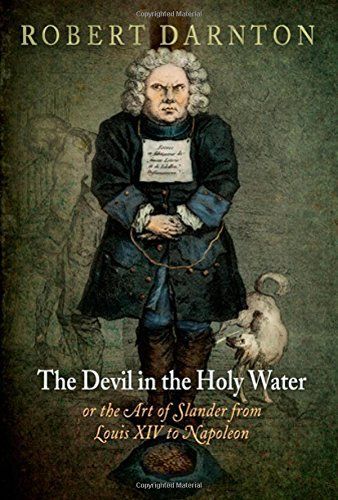
The Devil in the Holy Water, or the Art of Slander from Louis XIV to Napoleon
Slander has always been a nasty business, Robert Darnton notes, but that is no reason to consider it a topic unworthy of inquiry. By destroying reputations, it has often helped to delegitimize regimes and bring down governments. Nowhere has this been more the case than in eighteenth-century France, when a ragtag group of literary libelers flooded the market with works that purported to expose the wicked behavior of the great. Salacious or seditious, outrageous or hilarious, their books and pamphlets claimed to reveal the secret doings of kings and their mistresses, the lewd and extravagant activities of an unpopular foreign-born queen, and the affairs of aristocrats and men-about-town as they consorted with servants, monks, and dancing masters. These libels often mixed scandal with detailed accounts of contemporary history and current politics. And though they are now largely forgotten, many sold as well as or better than some of the most famous works of the Enlightenment. In The Devil in the Holy Water, Darnton—winner of the National Book Critics Circle Award for his Forbidden Best-Sellers of Pre-Revolutionary France and author of his own best-sellers, The Great Cat Massacre and George Washington's False Teeth—offers a startling new perspective on the origins of the French Revolution and the development of a revolutionary political culture in the years after 1789. He opens with an account of the colony of French refugees in London who churned out slanderous attacks on public figures in Versailles and of the secret agents sent over from Paris to squelch them. The libelers were not above extorting money for pretending to destroy the print runs of books they had duped the government agents into believing existed; the agents were not above recognizing the lucrative nature of such activities—and changing sides. As the Revolution gave way to the Terror, Darnton demonstrates, the substance of libels changed while the form remained much the same. With the wit and erudition that has made him one of the world's most eminent historians of eighteenth-century France, he here weaves a tale so full of intrigue that it may seem too extravagant to be true, although all its details can be confirmed in the archives of the French police and diplomatic service. Part detective story, part revolutionary history, The Devil in the Holy Water has much to tell us about the nature of authorship and the book trade, about Grub Street journalism and the shaping of public opinion, and about the important work that scurrilous words have done in many times and places.